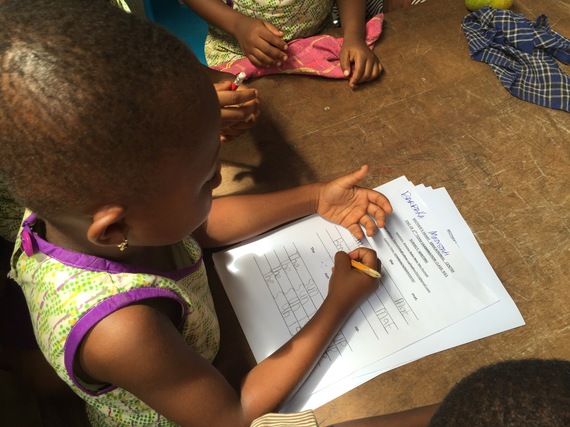By Irene Pritzker, IDP Foundation, Inc. (November 2016)
The Global Campaign for Education has been a powerhouse of education advocacy over the years, bringing together networks of campaigners from the grassroots in the poorest countries to the UN General Assembly, advocating for Education for All. GCE has made the world a better place, but I would be remiss if I did not share my disappointment with their latest report: 'Private Profit, Public Loss - why the push for low-fee private schools is throwing quality education off track' (GCE, 2016).
The report is written in response to the significant rise of low-fee private schools and the growing willingness of international investors and some sections of the aid community to support this burgeoning sector. World Bank data shows that private sector share of primary enrollments in low-income countries almost doubled between 1990 and 2010.
I was disappointed that the report uses a straw man tactic; that is, putting forward and refuting an argument that your interlocutor has not put forward, nor indeed believes. The report states, "a growing chorus of influential actors are advocating for increased privatization [sic] of education, and specifically the expansion of so-called "low-cost" or "low-fee" private schools (LFPS), as a sure solution to the education crisis. Central to this argument is that public education has been tried and has failed..." However, this is not true.
The IDP Rising Schools Program supports low-fee private schools in Ghana that serve communities with either the absence of or inadequate public schools, by providing loan capital and training to enable operators to expand infrastructure, train teachers, and improve the quality of education. However, we certainly do not believe that the private sector is a "sure solution" to the education crisis, nor do we believe that public education "has been tried and has failed." We firmly believe that the bulk of basic education services should and will be provided by the state and that this is where the vast majority of investments, ideas, and energy is, and should be focused. The IDP Rising Schools Program works with low-fee private schools because (i) almost no one else does - relative to the public sector, (ii) they are providing education services where the public sector cannot reach, (iii) they are innovating to find solutions, and (iv) the Government of Ghana and Ghanaian parents have encouraged us to do so.
Then there is the report's treatment of the evidence. In fact, the evidence on the effectiveness of low-fee private schools is pretty good - certainly mixed - but on balance. In attempting to answer the question "Can private schools improve education for children in developing countries?," the 2014 Rigorous Literature Review, funded by the UK Department for International Development (DFID), found positive evidence for eight testable hypotheses. These hypotheses included better learning, better teaching, lower costs, informed choice, users participating in decisions, responsiveness to user demands, subsidies improving quality, and complementing state provision. It also found negative evidence for equal accessibility for girls, financial sustainability, affordability, and state capacity to regulate. These are very serious problems, all of which are addressed through the IDP Rising Schools Program, and should not be dismissed or trivialized.
Low-fee private schools are clearly no panacea, though there is sufficient evidence - positive evidence of better teacher attendance, better teaching, and better learning outcomes at lower costs - to justify experimentation and proportionate support to private schools to expand the reach of the public sector, while protecting the overwhelming majority of public resources and aid for core funding. For those large aid agencies criticized in the report, such as DFID and the World Bank, the support they give to the low-fee private sector is small compared to the billions of dollars of annual support they collectively provide to the public sector.
The state must always be the guarantor of quality basic education for all, ensuring that no child is denied the right to basic education. In most, but not all cases, the state will be the financer and the service provider for basic education. The state should allocate resources commensurate with this guarantee (GCE's campaign work in this area is admirable). However, in most countries, the reality is that governments lack the resources and the capacity to meet rapidly rising demand for education, due to significant population growth. Given that the total costs of education in almost all cases exceed total available public resources, the state should also seek to harness private resources, including household spending from those willing and able to pay. Education for All will otherwise be impossible.
However, that being said, in the case of non-state financing and provision of services, the state has a critical regulatory function to ensure that non-state providers meet clear standards and guidelines and that no child is unable to go to school because of costs. Governments have a range of policy and financing measures they can put in place to address cost barriers to education, ensuring that education is available free at the point of use. They can do so within public-private partnership frameworks by providing subsidies either for the operators or directly to parents.
So please GCE, let us not make this a binary choice of public or private, right or wrong, or good or evil. Also, please do not build a straw man argument, stating that public has failed and private is a sure solution. Governments must indeed guarantee the right to basic education; however, the guarantee of that right should not be conflated with a necessary monopoly to provide all those services everywhere. Let us allow governments to choose, and let us provide proportionate support accordingly.
